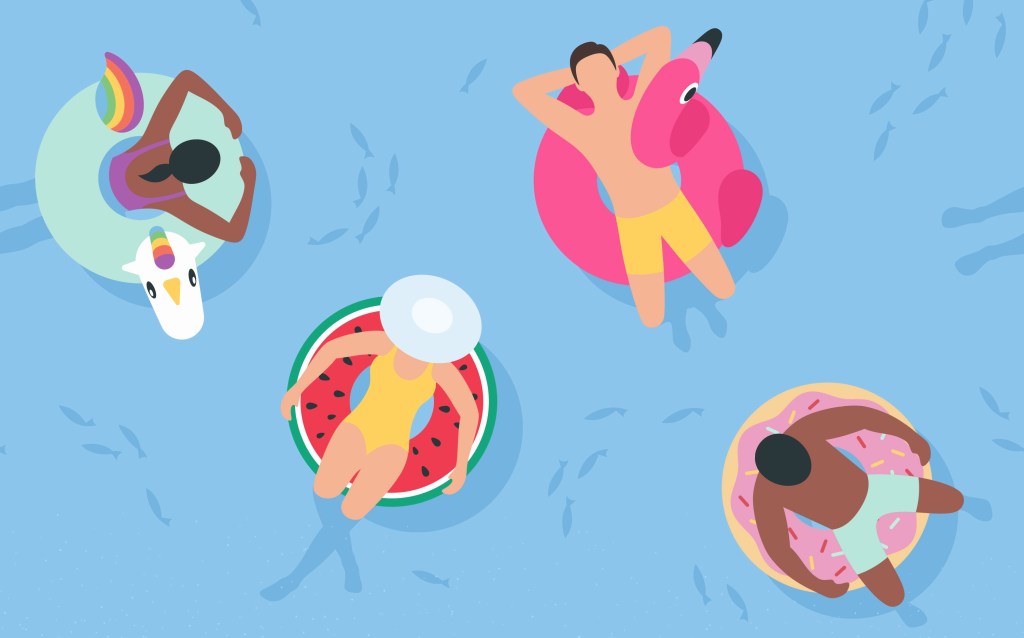Quintessential 1960s California band The Beach Boys quite famously spun summer and its happy vibes into solid gold hits for decades, and countless other artists before and since have also devoted studio time to extolling the season’s magic.
Is it all in our heads, or are there specific reasons that summer captures hearts and soothes souls so effortlessly?
From the positive impact that sunshine and time spent outdoors have on our physical health to the less stressful, more leisurely pace of life that seems to unfold around this time of year, here are a few insights — and a solid serving of scientific research — to better explain why summer lives up to the hype.
Benefits to Our Physical Well-Being
Daylight lasts longest during summer months, and scientific evidence shows that the amount of light we are exposed to during our waking hours directly impacts our bodies.
Samer Hattar, a scientist with the National Institute of Mental Health who studies light and circadian rhythms, spoke to Brain Facts about the effect of sunshine on the brain. In 2018, his team established a link between light and specific areas of the brain that are involved with emotion, reward, and decision-making.

“You need as much sunlight as you can get. If you can, go outside even if it’s cold,” said Hattar. “Don’t expose yourself to bright light at night. Being exposed to bright light at night will block melatonin production, a hormone your brain produces in response to darkness. Melatonin helps with the timing of your circadian rhythms and with sleep.”
There’s also the “sunshine vitamin” effect. Vitamin D, which is produced by our skin when exposed to sunlight, is essential for a healthy immune system, calcium absorption and bone strength, and fighting off diseases, and other important processes. Produce growing cycles also benefit from the increased light of summer, which results in a wider array of healthy fruits being available for our consumption as well.
And exposure to sunlight assists the body in producing and regulating melatonin, which plays a vital role in health sleep cycles and the quality of sleep obtained.
Being Outdoors and Connecting With Nature
Harsher winter weather conditions — like sleet, snow, and lower visibility — can restrict the mobility of our bodies as well as our various modes of transportation. In contrast, warmer weather encourages most of us to become more physically active due to a combination of factors, including an overall greater ease of movement and the aforementioned mood boosts provided by sunlight.
If you’ve been aiming to switch up your daily routine and spend more time outdoors, summer is a great time to begin. Instead of eating your lunch at the kitchen counter or your desk, consider setting up a blanket under a tree and taking your meal outdoors, or going for a leisurely walk around the block at the start of your break.

As previously reported by Nice News, prescriptions from medical professionals for patients to spend more time outdoors are growing in popularity to counteract the stressors of modern-day life. Naturally, summer provides many more days during which outdoor time and activities are both more enjoyable and feasible.
Furthermore, as noted by the American Psychological Association, research has established that time spent in nature offers cognitive benefits as well. Attentional functioning, improved working memory, cognitive flexibility, and attentional control have all been linked with increased access to green spaces and nature.
Take That Vacation
The link between stress levels and higher instances of sickness and disease is well established. Per the Physicians Regional Healthcare System, a study by the World Health Organization linked 745,000 deaths from stroke and heart disease in 2016 with working longer hours. The study noted that people who worked more than 55 hours per week had a 35% higher risk of stroke and a 17% higher risk of death from heart disease than people who worked 35-40 hours a week.
“Rest and recovery is important to your physical and mental health and that includes short breaks during regular days and totally disconnecting by taking a vacation from time to time,” said Dr. George Yiachos, who specializes in cardiovascular disease. “There is a large body of evidence that shows your body and brain need time to recharge. When we fail to take time off, we are more likely to suffer burnout, frustration, stress, and even serious health issues.”
Taking time off from work and other pressing responsibilities — even if you don’t have the means or ability to travel — goes a long way in keeping such burnout at bay.
Building Healthy Summer Habits
As with many other things in life, too much of a good thing also applies to soaking up those summer rays. Heatstroke and the damaging effects of too much sun exposure to skin are two common dangers that necessitate moderation and caution during warm weather.

Below are some practical tips for staying in optimal physical health during the summer months:
- Prevent dehydration by drinking plenty of water.
- Wear a hat when outside for any significant amount of time, even if the sun doesn’t feel particularly intense.
- Be diligent in applying sunscreen to any exposed areas of your body.
- Save physical activities — like gardening, yardwork, walking in the neighborhood, etc. — for either the morning or later in the evening when the heat is less intense.
- Certain medications may come with side effects if you’re exposed to heat and sunlight, so be sure to talk to your doctor about risks that may be associated with any medication you’re on.
- Keep your home cool by closing doors and windows and utilizing fans and air conditioning when temperatures rise.
- Indulge in a scoop of ice cream every now and then to trigger your sweet taste receptors and take your brain down memory lane.












